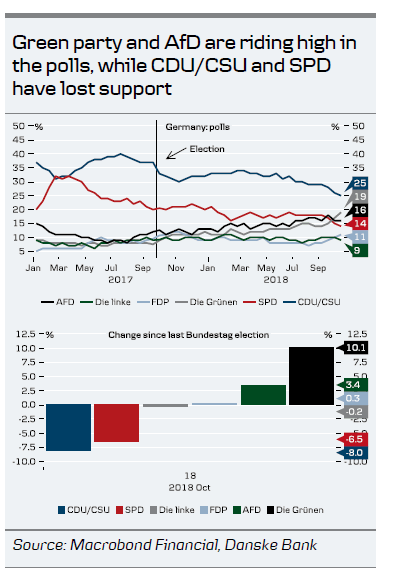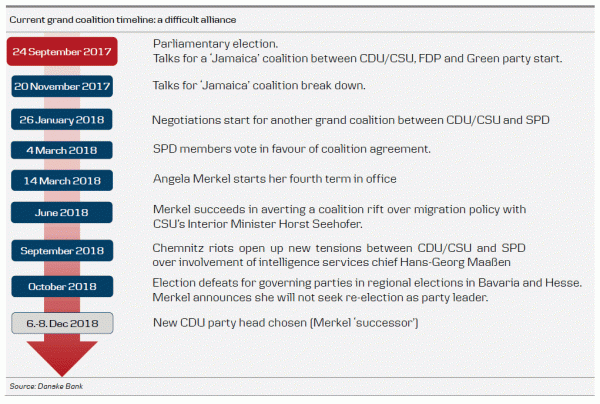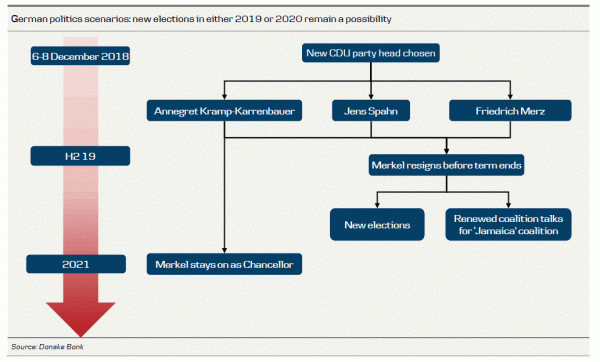Key points
- All three candidates to succeed Merkel are more conservative
- There is a risk Merkel will step down as Chancellor prematurely
- Snap elections are not a given, but remain a possibility in either 2019 or 2020
- Should Merkel step down, an important ‘stability anchor’ and experienced mediator on the European political scene would be gone
Political uncertainty returned to Germany on 29 October when Chancellor Angela Merkel announced that she will not stand for re-election as CDU party leader, following major regional election defeats in Hesse and Bavaria. Speculations about her eventual departure as Chancellor and the power vacuum this would create in Europe weighed additionally on current fragile market sentiment. Although Merkel’s stated intention is to fulfil her term until 2021, this will crucially depend on her successor, to be chosen at a CDU party conference 6-8 December. So far three candidates are in the race, all with more socially conservative views than Merkel:
Annegret Kramp-Karrenbauer (56). The former state premier of Saarland and the CDU’s current secretary-general is a close Merkel ally and well connected and popular within the party. We expect a high degree of policy continuity under her leadership.
Jens Spahn (38). The current health minister is a rising star of the CDU’s conservative wing and has been a vocal critic of Merkel’s migration policies. Under his leadership the CDU would be likely to adopt a more conservative stance on domestic policies and potentially also be less vocal on furthering EU integration.
Friedrich Merz (62). The most conservative among the three candidates and one of Merkel’s old rivals, which could spell trouble for any future cooperation. A successful corporate lawyer, Merz has strong business ties (currently heading the board of BlackRock) and low-tax/pro-market views, while also being a fiscal conservative.
Should either Merz or Spahn become CDU head, we expect the party to drift more towards the political right and see an increased risk that Merkel will step down as chancellor before her term ends. The timing remains uncertain, but in light of Brexit negotiations entering the hot phase, European Parliament elections coming up in May 2019 and the current polling of the governing parties, we think such a move more likely from H2 19 onwards. Much will also depend on the SPD coalition partner, which is also under pressure from dire election results and opposition to the grand coalition again rising within its ranks.
Should Merkel resign as chancellor prematurely, new elections for the Bundestag are not necessarily the next step. We could also imagine a scenario where renewed talks between CDU/CSU, FDP and the Greens lead to a so-called ‘Jamaica’ coalition, with the new CDU leader taking over as chancellor. That said, a more conservative CDU leadership under either Merz or Spahn could make finding such an agreement more difficult, especially with the centre-left Greens who are currently riding high in national polls.
Merkel’s departure would very likely also put an end to the current consensus style politics and positions between the political left and right might become more confrontational, both on domestic issues (i.e. immigration) but also foreign policy topics (i.e. eurozone reforms). Furthermore, an important ‘stability anchor’ from a market perspective and experienced mediator on the European political scene would be gone during a time when Eurosceptic parties are gaining more prominence and a rocky road still lies ahead with respect to Brexit and Italy.



